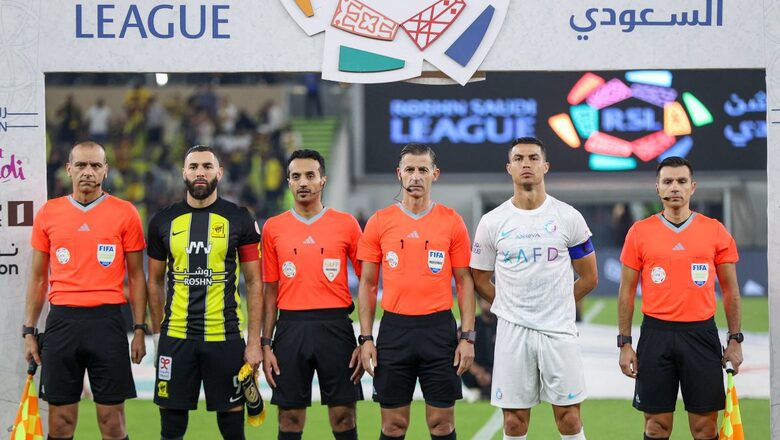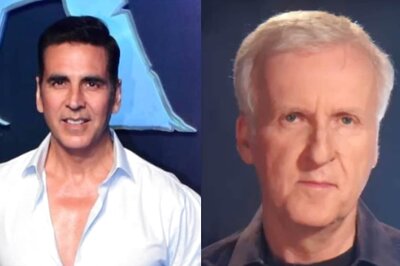
views
Lusail, November 22, 2022. World Cup season is in full effect and Saudi Arabia is facing off against the eventual 2022 World Cup winners Argentina in the group stage.
After a tumultuous first half, Argentina is leading 1-0. Saudi coach Herve Renard musters up his anger and frustration as he walks back down to the locker room with his players and winds up for a spirited speech.
“You just stand in front of the defense!” Renard screams at his midfielders. “Take your phone out, you can get a picture with him if you want! He has nobody [marking him]! Did you see what you are doing?!
“You don’t feel we are going to come back?! You don’t feel it?! They’re playing relaxed. Come on! Come on, guys! This is the World Cup – give everything!
And that is exactly what they did.
Two quick goals in the second half, from the likes of Saleh Al-Sheri himself, gave a spirited Saudi Arabia the lead.
Tensions were high and so was the confidence in the Saudi camp. So much so that centre-back Ali Al-Bulaihi even told the great Lionel Messi, “You will not win.”
Despite intense Argentine pressure, Saudi Arabia stood firm and when the final whistle blew, pandemonium ensues on the pitch, in the stands, and even in the press box. Players, supporters and journalists – from both nations – burst into tears. A moment to be etched in history, as the only team to defeat World Champions Argentina in what was otherwise a historic campaign for the Argentines.
This was merely the spark that ignited a seismic shift in the powers of the footballing world as Saudi Arabia would go on to bring about the most dramatic change in football history over the next year.
Now that the spirits of Saudi football were lifted, it was time to take the same momentum and bring about monumental change to the way that Saudi football as a whole is viewed across the globe. And the catalyst for a change of this size has to be as iconic as their ambitions themselves. An icon of the game, a showstopper, the ultimate game-changer, someone undeniable: someone like Cristiano Ronaldo.
Ronaldo was in the midst of a tumultuous second spell at his first home, Manchester United. The Portuguese superstar had just come off a disastrous World Cup campaign where he witnessed his eternal rival Lionel Messi rise to the pantheon of untouchable greats in football, and in his domestic career, Ronaldo was ready to take his talents away from Old Trafford yet again.
But with his superpowers seemingly diminishing over time and his age being a factor, many clubs were of the mindset that Ronaldo might simply not be worth signing. Well, this turned out to be fortunate for the Saudi League, to whom acquiring Ronaldo was priceless. The Saudi League, in the form of Al-Nassr, swooped in and took their chances with the legendary Portuguese. And strike the jackpot they did indeed in March of 2023.
At a time when the sporting world was mourning the loss of Pele, the very real ‘Cristiano Ronaldo Effect’ managed to momentarily draw the eyes of the media away from The King’s funeral procession in Brazil to a packed press room in Riyadh.
The whole world’s attention shifted to Saudi Arabia, as Ronaldo took to the press and said all of the right things, insisting that he wasn’t there solely for the money while at the same time stating that he didn’t care what anyone else thought about his transfer. He even went on to claim that more high-profile players would follow him to Saudi Arabia. And he was proven right yet again within a matter of months.
Within weeks of his arrival, Pro League TV rights deals were done with broadcasters all across Europe, including Italy, France and Germany, and it is now broadcast in more than 140 countries. The competition’s social media following also skyrocketed, going from 850,000 Instagram followers to more than 10 million in a matter of days.
As predicted by the man himself, The “Ronaldo Effect” eventually led to an unforeseen mass exodus of players from across all major European leagues taking their talents to the Arabian landscape.
The likes of Karim Benzema, Sadio Mane, Roberto Firmino, Jordan Henderson, Fabinho, N’golo Kante, and Aymeric Laporte among various others bid adieu to their Europe and settled for a fat paycheck in the Saudi Pro-League.
This was an unprecedented change of landscape in the footballing world. One unlike ever before. But still, the viewpoint that many onlookers held on to was that the majority of the layers who did join the Saudi League did so as they were nearing the end of their illustrious careers. It was merely a way for the “fading” superstars to attain their last big paycheck. But alas, they would be proven wrong yet again before they could even finish their thought as the Saudi League swooped in yet again to poach some of the most exciting young talents from across the globe.
Allan Saint-Maximin, Franck Kessie, Merih Derimal, Jota, Gabri Veiga, and Ruben Neves were a few of the many youngsters who gave up what one would have pictured as their dreams of winning the Champions League, to leave for Saudi Arabia.
Over the past few years, Saudi Arabia has already demonstrated both its economic might and the scale of its ambition in Formula 1, boxing, and golf. Indeed, it has effectively taken over the latter and there is no reason to think that football won’t be next.
Perhaps all that has transpired over the past year following Saudi Arabia’s historic victory in the World Cup is merely a glimpse into what the footballing world might be headed towards — a purely capitalist endeavour as the spirit of the beautiful game gets tarnished for the selfish purposes of those in power.
All that the Saudi world has done in the world of sport as a whole has been in its best interest to utilise the sacred name of sport as a weapon of socio-political influence. As a means to not rectify their wrongs but rather wash over them. A clear-cut case of greed and sportswashing at its finest.
And one does not have to take my word for it. These are rather the words of those in power themselves.
The crown prince of Saudi Arabia, Mohammed bin Salman, himself has said he “doesn’t care” about accusations of sportswashing against his country.
In an interview, Bin Salman said he was not troubled by such accusations and that he would carry on with his plans for as long as capital benefit is achieved through the very same means.
“If sport washing is going to increase my GDP by way of 1%, then I will continue doing sport washing,” Bin Salman told Fox News in the first interview he has given fully in English.
” I don’t care … I’m aiming for another 1.5%. Call it whatever you want, we’re going to get that 1.5%.”
But here is the flip side of it all. Mohammed bin Salman’s rule has been a truly dark time for human rights in Saudi Arabia, and no amount of talk about economic visions or an expansion into new sporting ventures should be allowed to distract from that fact.
Felix Jakens, the head of priority campaigns in Amnesty International stated to The Guardian: “Not caring about the sportswashing label is one thing, but Mohammed bin Salman also doesn’t seem to care about the peaceful activists languishing behind bars in Saudi Arabia, the 196 people executed in the country last year, or the personal pain of the family of Jamal Khashoggi who are still desperately hoping to see justice done in his case.”
But none of this seems to matter to Bin Salman. He relishes it all and understands the power that football holds. So for the time being, it seems as if Saudi Arabia will continue to play hard with the soft power that football grants them.

















Comments
0 comment